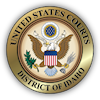 MONDAY, JANUARY 26, 2026
MONDAY, JANUARY 26, 2026 
 MONDAY, JANUARY 26, 2026
MONDAY, JANUARY 26, 2026 The conditions of supervision clearly relate your obligations and the Court’s expectations regarding your compliance. The consistent enforcement of conditions by the U.S. Probation Office is necessary to execute the sentence, reduce risks, and promote effective correctional treatment. Your actions that are not consistent with the conditions of supervision constitute noncompliant behavior and are a violation of your supervision. Violations may consist of new criminal activity or failure to meet the requirements of other conditions, commonly known as technical violations. Because violations can take many forms, may or may not require a particular intervention by statute, and may entail little substantial risk to the community, management of noncompliant behavior requires the use of a variety of interventions, or sanctions.
The following are examples of interventions, or sanctions, which may be used alone or in combination with each other.
The U.S. Probation Officer, in some cases, and for some violations, must file a violation report with the appropriate authority. Revocation is sometimes mandatory for certain violations. It is the responsibility of the Court or other appropriate authority to make a final determination about the violation(s), and it is at their discretion to decide on the appropriate sanction for noncompliant behavior.